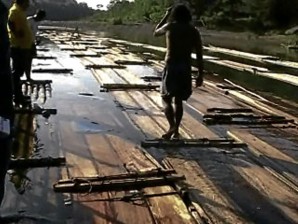
‘HOT’ LUMBER transported through a river are seized by personnel of the local government of General Tinio in Nueva Ecija. ARMAND GALANG
GENERAL TINIO, Nueva Ecija—Efren, a father of four from General Tinio, Nueva Ecija, has been an illegal logger since he was 15 years old. He has been poaching timber with a group in the Sierra Madre mountain ranges for the past 24 years.
Last week, municipal personnel caught Efren and four other people with some 10,000 board feet of lumber in the waters of the Minalungao National Park in the town’s Barangay Rio.
The haul reportedly came from Barangay Ibuna in Dingalan, Aurora, and was transported to General Tinio through “water logging,” in which illegally cut logs are allowed to float on the river and collected in designated spots along the waterway.
Efren said each member of his group of 10 to 15 usually borrowed P5,000 to P8,000 from a financier before they went to the mountains for a logging trip. He would leave a big portion of the money to his family and a little for his personal needs, including food, for the three months he was away.
“It takes us two months cutting trees and sawing them off. Transporting takes another month,” he said.
“We hurdle extreme difficulty before we are able to cut enough trees to fulfill our contract. Our lives are literally on the line in this kind of job,” he said.
With his meager income, he would send his children (the eldest is 9 years old) to a public elementary school. He could not provide his family a television set or the simplest entertainment gadgets.
“We earn little, just enough to cover our family’s meals,” he said.
According to Mayor Virgilio Bote, illegal logging activities in his town have been thriving for over 20 years, involving at least 600 families. These largely benefit unscrupulous businessmen and are concentrated on forested villages.
“At the start, illegal loggers operated only within our town. Now, they have ventured into forests in Aurora, Quezon and Bulacan,” Bote said.
Tough job
The fight against illegal logging, the mayor said, has been a tough job for the local officials and other agencies, including the military, for humanitarian reasons.
“When you arrest them in the mountains, you cannot haul the seized items to the lowlands. So we operate in areas where we can seize the illegally cut logs. But when you do that, you will pity them because these are products of more than a month of hard work by these poor people,” Bote said.
The campaign was intensified after the Department of Environment and Natural Resources (DENR) in Central Luzon formed a multisectoral forest protection committee (MFPC) in General Tinio, which is composed of 13 villages. The town, along with Gabaldon in Nueva Ecija, is considered an illegal logging hot spot in the region, said the department’s regional executive director, Maximo Dichoso.
Rev. Orlan Valino, General Tinio parish priest, was named chair of the MFPC. Its members are representatives from the DENR, municipality, nongovernment organizations, police and the military.
A DENR report showed that timber poaching activities in General Tinio were started by around 50 families in 1986. This number grew to 1,000 (5,000 people) in 1998, it added.
More than 82 percent or 55,982.40 hectares of the town’s area of 68,229.29 ha is “forest, hills and other pasture land,” Dichoso said. “The forest, therefore, should be an asset of General Tinio,” he said.
He offered the agency’s assistance in creating a land-use plan.
Angat Dam water source
Bote acknowledged that illegal logging had been thriving in the same watershed areas that feed the Angat Dam, the water source of people in Metro Manila.
He warned of an impending disaster if illegal logging activities were not stopped. “This is part of the Sierra Madre, the water source of Angat Dam. If we do not act, I dread the situation in 10 to 15 years where the watershed would be destroyed,” he said.
Illegal loggers in General Tinio have been operating for four generations, the mayor said.
“While many are stubborn, others have lost interest in farming. We are in an upland area, with no access to irrigation supply, so farmers would only rely on rains so they could till their land,” he said.
Some have engaged in “kaingin” (slash and burn farming) and charcoal production that destroy patches of forests, he said.
The best and immediate solution to stop illegal logging is to include the families in the government’s conditional cash transfer program or Pantawid Pamilyang Pilipino Program (4Ps), Bote said.
“The lives of those who benefited from this program have improved,” he said. Under the 4Ps, each family beneficiary receives P1,300 in monthly allowance.
Should he be given an alternative livelihood. Efren said he would stop engaging in illegal logging. “I learned this illegal trade as a child. I don’t want my children to follow my path,” he said.